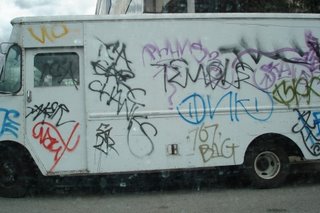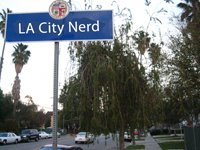 Finally, someone's listening...
Finally, someone's listening...Maybe CD2's staff read this blog when I mentioned trucks covered in graffiti back in April, but Councilwoman Greuel has finally done something about it. On April 28th (coincidentally, 16 days after my post), she introduced a motion directing the City Attorney to draft an ordinance to allow the City to cite vehicles parked on City streets for graffiti violations (which is currently only allowed if the vehicle is parked on private property). According to her recent newsletter, Councilwoman Greuel says...
"In an effort to help clean-up graffiti in blighted neighborhoods, I recently introduced a motion to create a Mobile Graffiti team that would grant the city authority to issue citations to owners of graffiti-covered vehicles parked on public streets. I believe the city should use every resource available to ensure that all communities are able to enjoy a high quality of life."
By the way, when I checked this week, my favorite graffitied truck (above) was still parked on the street... I can't wait for this ordinance to be written, approved, and put into effect.


2 comments:
That sounds like a really bad idea to me. Who determines what "graffiti" is officially, when it is on a vehicle?
A ban on "graffiti" on cars will intrinsically need to ban writing on vehicles in general - a broad and unjust use of our system of laws. Additionally, giving the police, or another government agency, the right to determine what is, and isn't "graffiti" on a car sets up a situation that is ripe for abuse.
I've seen RV's driving around the westside with all kinds of insane political propoganda spray-painted onto the side by the owner. I've seen VW bugs and Scion's with advertisements all over them. There are tradesmen who place their company's name and phone number on their vehicle. Police cars have writing on their exteriors.
None of these uses seriously affects the "quality of life" of residents. Is it wrong if my neighbor wants to paint racing stripes and the number 9 on his mustang?
When a piece of property is fixed to the ground (i.e. a wall or another type of stucture or geographical feature) it is easy to write laws about how it should look. People expect some sort of uniform color on the surface of buildings and geographical features (like big rocks). When someone paints words, letters, or images on a publicly viewable surface, it is easy to write laws that ban that entire act. Our laws against "graffiti" are really laws that are created to stop unauthorized writinng and painting on fixed property.
As far as I know, there is no definition of "graffiti" required to make our laws about painting function. Any painting on a wall that isn't a uniform color, and that doesn't have some sort of permit from the City, can be considered an illegal painting.
Here's a suggestion that will piss people off:
How about trying to find the young men who do this unauthorized form of painting, give them some training in one of the many facets of commercial or fine art? Or simply give them a domain to legitmately practice this art (i.e. the graffiti wall in Venice Beach - which is a testament to the untapped creativity and potential of our fellow citizens).
How about giving the city the authority to prowl the streets with roving paint sprayers? First a citation, then, if you don't get it fixed within a certain period of time, the sprayer moves in.
Of course this is random grafitti, not "art." This is classic "broken windows" stuff.
Post a Comment